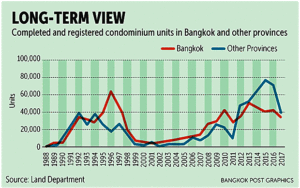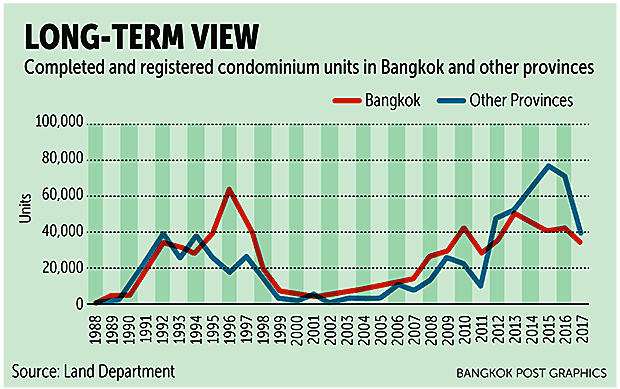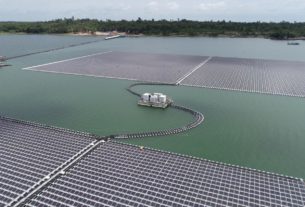 Provincial condo market outpaces Bangkok supply
Provincial condo market outpaces Bangkok supply
The floods of 2011 marked a turning point, with developments in coastal cities mushrooming as residents fled central Thailand and weekend homes grew in popularity
The condominium market in other provinces outside Bangkok became more interesting after 2011, says Surachet Kongcheep, a property market expert.
Many condominium projects were launched in the wake of the massive flooding that struck central Thailand that year. Flood victims who lived in Bangkok and the vicinity moved to farther-out cities, especially Pattaya, Cha-am and Hua Hin.
Many hotels, resorts, apartments, hostels and condos for rent were fully booked within a few days, though only for a short time period.
Some residents of Bangkok are still looking to buy a condo or house in a city close to the capital. Developers are taking the opportunity to launch new residential projects in desirable coastal locations, especially listed developers which are launched many new condominium projects in all tourist destinations and all main cities of each part of Thailand.
Coastal cities within a two-hour drive of Bangkok are growing in popularity, both for emergency shelter and weekend homes.
In fact, major cities in each region of Thailand are gaining traction, with many listed developers launching new condominium projects in these locations.
Some areas are seeing activity for the first time by listed or big-name developers. Many local developers in these locations are struggling to compete with well-known developers and are directly affected by this movement of the property market.
In addition, high-speed train projects envisioned to link Bangkok to other cities around Thailand, and economic corridors connecting Thailand to neighbouring countries, are the main factors driving residential interest in some provinces over the past few years.
Some of the more attractive provinces around Thailand include Chiang Mai, Khon Kaen, Udon Thani and Nakhon Ratchasima.
In these parts, a major developer’s launch of a single condominium project with 1,000 units is enough to swing the local market, where some locations only see increases of a few hundred units, if that, every year.
Furthermore, some big-name developers have entered these markets, with condominium investment fuelling the trend among local buyers.
The big names are playing catch-up in the local market.
The condominium market boom in provinces outside Bangkok unfurled over several years after the catastrophic floods as many big-name developers launched new condominium projects in these locations.
The market in these locations slowed significantly in 2014. Some condominium projects with more than 1,000 units are still available for sale now.
Some condominium projects have been cancelled or still cannot finish their construction process as advertised in the brochure or committed to by buyers.
The main problems of some small developers in these local markets is they cannot get loans from the banks, because the sold rate has not lived up to their commitment.
The other factor directly hurting condominium popularity in other provinces is the lack of skytrain and subway lines. As a result of this scarcity, land prices in these locations are still low and traffic jams are a headache for those travelling between provinces, a dramatic difference by comparison with Bangkok and its outskirts.
Condominium prices are still similar to housing prices in the same locations. Housing projects are more interesting than condominiums in provinces outside the Bangkok area.
New condominium projects launched in provinces outside of Bangkok have dramatically decreased or returned to a normal situation again.
Many condominium projects that were launched have finished construction, however, especially between 2012 and 2016.
A great number of developers that already knew the condominium market in other provinces have found it difficult and encountered many problems.
Many developers cancelled some new projects or tried to find a way to release their completed and ready-to-move-in units.
Since 2014, the condominium market in other provinces has grown more slowly. The number of condominiums completed and registered with the Land Department has decreased significantly.
The condominium market in provinces outside of Bangkok may become more interesting again in the next few years, if all the light rail projects in some provinces that are starting to develop come to fruition and push up land prices in the areas along the transit routes.
The light rail projects will become one of the new positive factors boosting the condominium market in some provinces.
Source: https://property.bangkokpost.com/news/1452042/provincial-condo-market-outpaces-bangkok-supply

